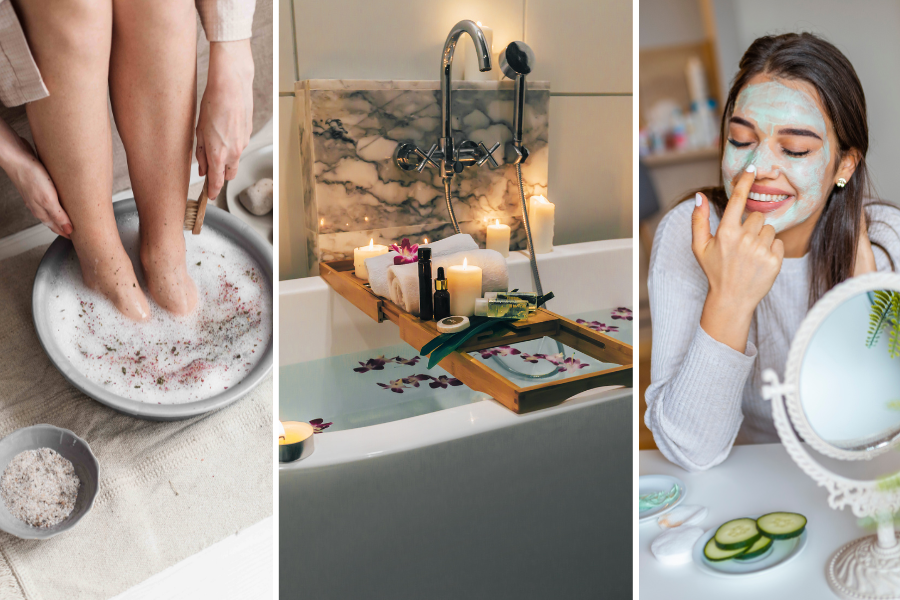In the hustle and bustle of daily life, it’s easy to forget to take care of the most important person—you. A daily self-care routine is essential for maintaining balance, reducing stress, and enhancing your overall well-being. Whether you’re new to self-care or looking to refine your routine, this guide will help you create a daily practice that nurtures your mind, body, and soul. By dedicating time each day to self-care, you can improve your mental and physical health, boost your energy, and create a more fulfilling life. Ready to prioritize yourself? Let’s explore how to build a daily self-care routine that works for you.
Daily Self-Care Routine
Understanding the Importance of Daily Self-Care
How Self-Care Impacts Mental, Emotional, and Physical Health
Daily self-care is crucial for maintaining overall well-being:
- Mental Health: Regular self-care helps manage stress, reduce anxiety, and improve focus.
- Emotional Balance: It fosters emotional resilience by allowing time for reflection and relaxation.
- Physical Wellness: Self-care activities like exercise, proper nutrition, and adequate sleep contribute to physical health.
The Benefits of Consistent Self-Care Practices for Long-Term Well-Being
Consistency in self-care leads to lasting benefits:
- Sustained Energy: Consistent self-care keeps your energy levels balanced, preventing burnout.
- Improved Relationships: Taking care of yourself enhances your ability to connect with others.
- Enhanced Quality of Life: Regular self-care contributes to a more fulfilled and happy life.
How to Recognize When You Need More Self-Care in Your Daily Life
Recognizing when you need more self-care is key to preventing overwhelm:
- Signs of Burnout: Feeling constantly tired, irritable, or overwhelmed may indicate a need for more self-care.
- Emotional Clues: Increased anxiety, sadness, or stress are signals to prioritize self-care.
- Physical Symptoms: Frequent headaches, muscle tension, or digestive issues can be signs that your body needs more care.
Morning Self-Care Rituals to Start Your Day Right
The Benefits of a Mindful Morning Routine for Setting a Positive Tone
A mindful morning routine sets the stage for a successful day:
- Positive Start: Beginning your day with intention helps you approach challenges with a clear and calm mind.
- Increased Focus: Morning self-care rituals can sharpen your focus and boost productivity throughout the day.
- Improved Mood: Engaging in positive activities in the morning can elevate your mood and reduce stress.
Ideas for Morning Self-Care Practices (e.g., Meditation, Journaling, Stretching)
Incorporate these practices into your morning routine:
- Meditation: Start your day with a few minutes of meditation to center your mind.
- Journaling: Write down your thoughts, goals, or things you’re grateful for to set a positive tone.
- Stretching: Gentle stretches help wake up your body and prepare you for the day ahead.
How to Create a Morning Routine That Energizes and Prepares You for the Day Ahead
Design a morning routine that works for you:
- Consistency: Stick to a routine that you enjoy and that makes you feel energized.
- Personalization: Choose activities that resonate with you and set a positive tone for your day.
- Gradual Start: Allow yourself time to ease into the day without rushing, promoting a calm and focused mindset.
Nourishing Your Body with Healthy Habits
The Importance of Nutrition and Hydration in Daily Self-Care
Proper nutrition and hydration are foundational to self-care:
- Energy Levels: Balanced meals and adequate hydration keep your energy stable throughout the day.
- Mental Clarity: Eating nutrient-dense foods supports brain health, enhancing focus and cognitive function.
- Physical Health: Proper nutrition supports your body’s functions, from immunity to digestion.
Tips for Planning and Preparing Balanced Meals That Fuel Your Body
Meal planning is key to maintaining a nutritious diet:
- Meal Prep: Prepare meals in advance to ensure you have healthy options available.
- Balanced Diet: Include a variety of fruits, vegetables, lean proteins, and whole grains in your diet.
- Mindful Eating: Eat slowly and mindfully, paying attention to your body’s hunger and fullness cues.
How to Incorporate Movement and Exercise into Your Daily Routine for Physical Wellness
Daily movement is essential for physical self-care:
- Short Workouts: Incorporate quick, effective workouts into your routine, such as a 15-minute walk or a quick yoga session.
- Active Breaks: Take regular breaks to stretch or move around during your day, especially if you have a sedentary job.
- Enjoyable Activities: Choose physical activities you enjoy to stay motivated, whether it’s dancing, cycling, or hiking.
Mental and Emotional Self-Care Throughout the Day
Strategies for Managing Stress and Maintaining Mental Clarity During the Day
Managing stress is critical to staying mentally and emotionally balanced:
- Prioritization: Focus on one task at a time to reduce overwhelm and improve productivity.
- Mindful Breaks: Take short breaks to breathe deeply or meditate, helping to maintain mental clarity.
- Positive Affirmations: Use positive affirmations throughout the day to keep a positive mindset.
How to Use Mindfulness and Relaxation Techniques to Stay Grounded
Mindfulness and relaxation can be practiced throughout the day:
- Mindful Breathing: Practice deep breathing exercises to stay grounded during stressful moments.
- Relaxation Exercises: Incorporate relaxation techniques such as progressive muscle relaxation or guided imagery to reduce tension.
- Stay Present: Focus on the present moment, letting go of worries about the past or future.
Tips for Setting Boundaries and Prioritizing Tasks to Avoid Overwhelm
Setting boundaries is essential for maintaining balance:
- Say No: Learn to say no to additional tasks or commitments that may overwhelm you.
- Prioritize Tasks: Focus on the most important tasks and let go of non-essential ones.
- Delegate: Don’t be afraid to delegate tasks to others to lighten your load.
Taking Breaks and Practicing Mindfulness
The Importance of Taking Regular Breaks to Recharge and Refocus
Regular breaks prevent burnout and maintain productivity:
- Short Breaks: Take 5-10 minute breaks every hour to recharge and refocus.
- Movement Breaks: Use breaks to stretch, walk, or move your body to prevent stiffness and boost energy.
- Mental Breaks: Give your mind a rest by stepping away from work and engaging in a different activity.
Simple Mindfulness Exercises to Incorporate into Your Workday
Mindfulness can be integrated into your daily routine:
- Deep Breathing: Take a few deep breaths to center yourself before starting a new task.
- Mindful Observation: Spend a minute observing your surroundings with full attention, noticing details you may have overlooked.
- Gratitude Check-In: Pause to think of something you’re grateful for, shifting your mindset to a positive state.
How to Use Mindful Breathing to Stay Present and Reduce Stress
Mindful breathing is a quick way to manage stress:
- Inhale-Exhale: Focus on your breath, inhaling deeply through your nose and exhaling through your mouth.
- Count Breaths: Count your breaths to maintain focus and prevent your mind from wandering.
- Anchor Yourself: Use your breath as an anchor to bring your attention back to the present moment.
Evening Self-Care Practices for Winding Down
The Role of an Evening Routine in Promoting Relaxation and Restful Sleep
An evening routine prepares your mind and body for rest:
- Unwind: Spend the last hour before bed engaging in relaxing activities to signal to your body that it’s time to sleep.
- Limit Stimulation: Avoid stimulating activities such as screen time to promote relaxation.
- Consistency: Stick to a consistent evening routine to regulate your sleep patterns.
Ideas for Evening Self-Care Activities (e.g., Reading, Skincare, Gratitude Journaling)
End your day with calming self-care activities:
- Reading: Choose a calming book or article to read before bed to relax your mind.
- Skincare: Engage in a soothing skincare routine that helps you unwind and feel pampered.
- Gratitude Journaling: Write down things you’re grateful for as a way to end the day on a positive note.
How to Create a Bedtime Ritual That Helps You Unwind and Prepare for Sleep
A bedtime ritual sets the stage for restful sleep:
- Relaxing Environment: Create a calming bedroom environment with soft lighting and comfortable bedding.
- Wind Down: Spend 30 minutes winding down with activities like stretching, reading, or meditating.
- Sleep Hygiene: Practice good sleep hygiene by keeping a consistent sleep schedule and limiting screen time before bed.
Social and Connection-Based Self-Care
The Importance of Maintaining Social Connections for Emotional Well-Being
Social connections are vital for emotional health:
- Support Network: Cultivate relationships with people who support and uplift you.
- Regular Contact: Make time to connect with loved ones regularly, whether in person or virtually.
- Balance: Balance social activities with personal time to ensure you’re not overwhelmed.
Ideas for Nurturing Relationships and Spending Quality Time with Loved Ones
Quality time with loved ones strengthens bonds:
- Shared Activities: Engage in activities you enjoy together, such as cooking, walking, or watching movies.
- Meaningful Conversations: Take time to have deep, meaningful conversations that strengthen your connection.
- Express Gratitude: Regularly express appreciation for your loved ones, fostering a positive and supportive relationship.
Tips for Balancing Social Activities with Personal Time
Balance is key to maintaining well-being:
- Schedule Time: Schedule time for both social activities and personal self-care to maintain balance.
- Set Boundaries: Set boundaries with friends and family to ensure you have time for yourself.
- Listen to Your Needs: Pay attention to when you need social interaction versus when you need alone time.
Personal Growth and Creative Expression
How Self-Care Includes Pursuing Hobbies and Activities That Bring You Joy
Self-care involves doing things that make you happy:
- Hobbies: Engage in hobbies that bring you joy and fulfillment, whether it’s painting, writing, or gardening.
- Creative Expression: Use creative activities as an outlet for self-expression and emotional release.
- Growth Opportunities: Pursue activities that challenge you and promote personal growth.
The Benefits of Engaging in Creative Expression for Mental Health
Creative expression supports mental well-being:
- Stress Relief: Engaging in creative activities can help reduce stress and provide an emotional outlet.
- Increased Happiness: Creating something with your hands or mind can boost your mood and overall happiness.
- Mindfulness: Creative activities require focus and presence, which can be a form of mindfulness.
Tips for Making Time for Personal Growth Activities Like Reading, Learning, or Crafting
Make time for activities that contribute to your growth:
- Set Goals: Set personal goals for reading, learning, or creative projects and work towards them regularly.
- Daily Doses: Incorporate small doses of personal growth activities into your daily routine, such as reading for 10 minutes a day.
- Schedule Creativity: Block out time in your schedule specifically for creative expression and personal development.
Adapting Your Self-Care Routine to Your Needs
How to Listen to Your Body and Mind to Determine Your Self-Care Needs
Your self-care routine should adapt to your needs:
- Tune In: Regularly check in with yourself to assess how you’re feeling physically, mentally, and emotionally.
- Respond to Signals: Adjust your self-care routine based on how you feel, whether you need more rest, relaxation, or activity.
- Flexible Approach: Be open to changing your routine as your needs evolve, recognizing that self-care is not one-size-fits-all.
Tips for Adjusting Your Routine Based on Your Schedule and Energy Levels
Adapt your self-care routine to fit your lifestyle:
- Time Management: Adjust the timing and duration of your self-care activities based on your schedule.
- Energy Consideration: Plan more active self-care practices for when your energy is high and more restful ones for when it’s low.
- Simplify When Needed: On busy days, focus on simple, quick self-care practices that still provide benefit.
The Importance of Flexibility and Self-Compassion in Maintaining a Routine
Flexibility and compassion are key to a sustainable routine:
- Be Kind to Yourself: Practice self-compassion if you miss a day or can’t stick to your routine perfectly.
- Adaptation Over Perfection: Focus on adapting your routine to fit your needs rather than achieving perfection.
- Forgive Slip-Ups: Understand that it’s okay to have off days and that you can always start fresh the next day.
Tracking Your Self-Care Progress
The Benefits of Keeping a Self-Care Journal or Using an App to Monitor Your Routine
Tracking your self-care helps you stay consistent:
- Self-Reflection: Journaling allows you to reflect on your self-care practices and their impact on your well-being.
- Accountability: Using an app or journal helps you stay accountable to your self-care routine.
- Pattern Recognition: Tracking helps you identify patterns, such as what activities are most beneficial or when you tend to skip self-care.
How to Reflect on Your Self-Care Practices and Make Necessary Adjustments
Regular reflection ensures your routine remains effective:
- Weekly Review: Take time each week to review your self-care routine and how it made you feel.
- Adjust as Needed: Make adjustments to your routine based on your reflections, such as adding new activities or removing ones that aren’t working.
- Celebrate Successes: Acknowledge the progress you’ve made in maintaining your self-care routine.
Tips for Celebrating Small Wins and Staying Motivated to Continue Your Routine
Celebrating your progress keeps you motivated:
- Acknowledge Achievements: Celebrate small milestones in your self-care journey, such as sticking to a routine for a week.
- Reward Yourself: Treat yourself to something special, like a relaxing bath or a favorite snack, as a reward for maintaining your routine.
- Stay Positive: Focus on the positive changes you’ve noticed since starting your self-care routine, which can motivate you to keep going.
By incorporating these practices into your daily self-care routine, you can enhance your overall well-being and create a balanced, fulfilling life.
Daily Self-Care Routine Wrap Up:
Creating a daily self-care routine is an ongoing journey that allows you to prioritize your well-being, maintain balance, and lead a more fulfilling life. By incorporating practices that nurture your mind, body, and soul, you can enhance your health, reduce stress, and enjoy greater overall happiness. Remember, self-care is personal, so tailor your routine to fit your unique needs and lifestyle. Start today by implementing these ideas, and watch how daily self-care transforms your life. Ready to commit to your well-being? Follow this guide to establish a daily self-care routine that supports your mind, body, and soul every day.
This post was all about Daily Self-Care Routine.
Other Posts You Might Like:





